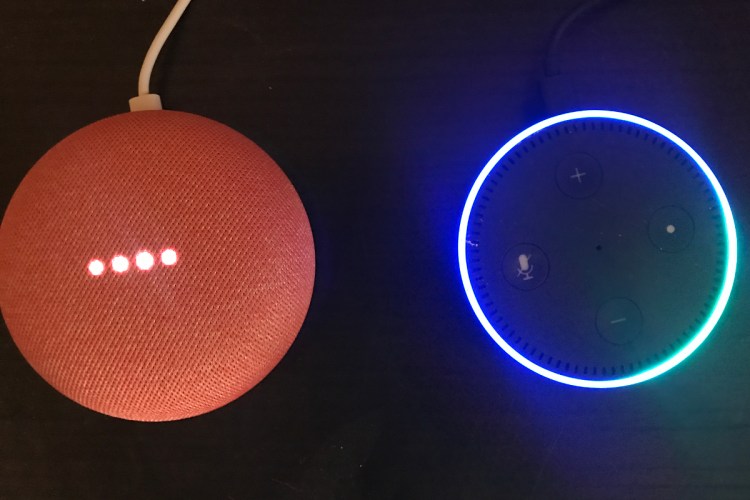Watch all the Transform 2020 sessions on-demand here.
Amazon Echo and Google Home smart speakers, the number one and number two most popular smart speakers in the United States, are in tens of millions of households today, and things are only likely to heat up as the two tech giants take steps to put Alexa and Google Assistant in every home.
It’s not just about which speaker you choose to play music or set a timer, or even the sale of smart speakers. Arguably what’s at stake, as conversational AI grows more reliable and robust, is who gets to act as a portal to streaming video services, streaming audio, web searches, shopping, and someday a bevy of in-home services.
That’s the tension at play when you see Google kick Amazon Echo devices off YouTube and Amazon ban Google’s Nest smart home devices from its online marketplace.
That’s also why Morgan Stanley analyst Brian Nowak told Marketplace today that Google parent company Alphabet should buy every household in the United States a $49 Home Mini smart speaker. At a price of $3.3 billion, doing so could help the company compete with Amazon and return profits five times over in retail search gains.
June 5th: The AI Audit in NYC
Join us next week in NYC to engage with top executive leaders, delving into strategies for auditing AI models to ensure fairness, optimal performance, and ethical compliance across diverse organizations. Secure your attendance for this exclusive invite-only event.
The drastic move could be important, Nowak argues, because Amazon is edging in on Google’s search market share.
While that may seem like an outlandish statement and something that could potentially heighten people’s fear of Big Brother tendencies in big tech companies, it’s actually not all that crazy.
There’s a lot potentially at stake in the smart speaker market.
In line with a previous estimate that put the number around $40 billion, Morgan Stanley predicts voice shopping to be a $44 billion market by 2022 and for a majority of U.S. households to have a smart speaker.
While Amazon dominates the ecommerce realm, Google Assistant voice shopping works with the biggest retailers in the United States, including Costco, Target, and Home Depot.
Pharmaceutical drugs are also on the way from Amazon after it acquired PillPack today, a company that delivers pharmaceutical drugs, causing stock for CVS, Walgreens, and Rite-Aid to plummet $12 billion.
Analysis by Voicebot.ai released yesterday called growing voice search adoption a “gateway into voice shopping,” noting that about 20 percent of U.S. consumers have shopped using their voice, typically to buy items worth less than $100 — things like everyday household items as well as consumer electronics, games, and apparel.
Though Nowak is concerned about Google’s U.S. market share, different trends may be shaping up in other parts of the world.
A report out last month from Strategy Analytics found that Google Assistant is making gains on Alexa’s domination of the smart speaker market. According to the firm, Amazon enjoyed 81 percent of global smart speaker market share and Google 12 percent in Q1 2017. But Amazon’s market share shrank to 43 percent in Q1 2018, compared to Google’s 26 percent of market share.


